- NASA Home
- | Centers
- | White Sands Test Facility (WSTF)
- | Hardware Processing
- | Flight
Flight and Critical Hardware, Design, and Depot Processing
- Refurbishment of flight hypergolic propellant components for the space shuttle
- Refurbishment of flight components for the ISS
- Repair
- Failure investigation
- Assembly and acceptance testing of flight components
- Piece-part fabrication
- Cleaning and decontamination
- Data pack preparation
- Flow benches (Class 100) and clean rooms (Class 10,000 and Class 100)
- Inspection
Capabilities consist of certified processes, systems, and facilities for the repair, refurbishment, and acceptance testing of flight hardware, including piece-part fabrication, acceptance testing, data pack preparation, failure analysis, and anomaly investigation. Currently WSTF flight hardware processes include shuttle primary and vernier thrusters, the Shuttle Atmospheric Revitalization Pressure Control Subsystem panel, and the International Space Station (ISS) Oxygen Recharge Compressor Assembly (ORCA). The WSTF Depot is responsible for the design and/or processing of flight, critical, and test hardware at WSTF. Its focus is to streamline and integrate processes and infrastructure in producing hardware efficiently and economically.
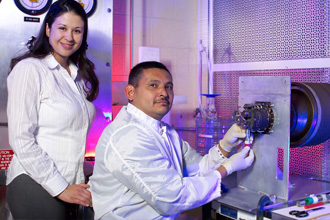
Jennifer Cordova and Ray Montoya conduct flight critical system components refurbishment at WSTF.
The Hardware Processing Component Test Facility (CTF) was certified as an Orbiter Depot Repair Agency in June 1993. Since then, the CTF has also been certified as an ISS Depot Repair Facility. A repair certification for a particular component consists of a review of facilities, personnel, equipment, and procedures developed for that repair. Upon certification, hardware previously repaired at the original equipment manufacturer is instead sent to WSTF.
CTF has performed flight hardware assembly, repair, and acceptance testing for other private aerospace manufacturers. The CTF depot business line provides the following services: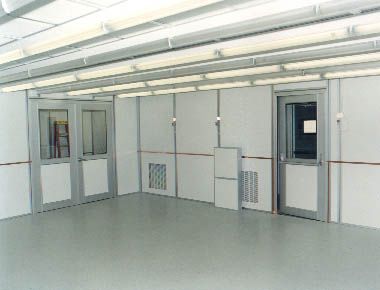
Class 100 Cleanroom used for the ISS ORCA
Primary Reaction Control Subsystem Thruster: The PRCS thruster provides propulsion capability for orbiter attitude control during ascent, orbit, and entry related phases of flight. The PRCS thruster is an
870 lbf, hypergolic, pressure-fed, fixed thrust engine. There are 38 PRCS thrusters per orbiter vehicle.
The WSTF Depot is certified to perform preventative maintenance, flushing, removal and replacement of failed thruster components, flow rate certification, and acceptance testing including engine hot-fire. WSTF is also certified to perform overhaul and repair of the fuel and oxidizer valve subassemblies.
The Vernier Reaction Control Subsystem (VRCS) thruster provides propulsion capability for orbiter attitude control during orbital related phases of flight. The VRCS thruster is a 25 lbf, hypergolic, pressure-fed, fixed thrust engine. There are six VRCS thrusters per orbiter vehicle.
The WSTF Depot is certified to perform decontamination, removal and replacement of failed VRCS thruster components, replacement of injector standoffs and chamber subassemblies, and acceptance testing including engine hot-fire. WSTF is also certified to perform overhaul and repair of the fuel and oxidizer valve subassemblies.
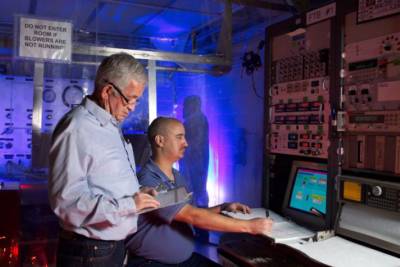
Bob Waggoner and Brian Doyan collect Acceptance Test Procedures (ATP) data for critical flight hardware.
Orbital Maneuvering Subsystem (OMS/RCS) Engine and Series Valve Repair: The orbital maneuvering subsystem engine (OMS-E) provides propulsion capability for the orbiter during orbital insertion and deorbit maneuvers. The OMS-E is a 6,000 lbf hypergolic, pressure-fed, fixed thrust engine. There are two OMS engines per orbiter vehicle. The WSTF Depot is certified to perform decontamination, disassembly, reassembly, failure analysis, repair, and acceptance testing of the OMS engine. WSTF is also certified to perform overhaul and repair of the bipropellant series valve and pneumatic package subassemblies.
OMS/RCS Quad Check Valve: The quad check valve (QCV) installed in the orbiter OMS/RCS propellant pressurization system is designed to prevent propellant backflow into the helium pressurization system. There are ten QVCs per orbiter vehicle.The WSTF Depot is certified to perform decontamination, disassembly, reassembly, failure analysis, component overhaul, and acceptance testing of the QCV.
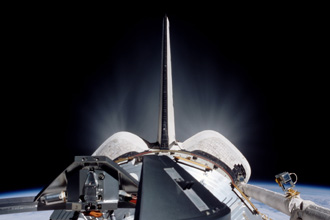
View of shuttle aft pod during an OMS fuel purge
OMS/RCS AC Motor Valve: The AC motor valve installed in the orbiter OMS/RCS propellant feed system is designed to provide propellant tank, propellant manifold, OMS/RCS interconnect, and cross-feed isolation. There are 64 ac motor valves per orbiter vehicle. The WSTF Depot is certified to perform general disassembly, reassembly, failure analysis, repair, and acceptance testing of the AC motor valve and actuator/valve subassemblies.
OMS/RCS Manual Valve: The manual valve installed in the orbiter OMS/RCS propellant pressurization system is designed to isolate the propellant tank from the pressurization system during ground operations. There are ten manual valves per orbiter vehicle.
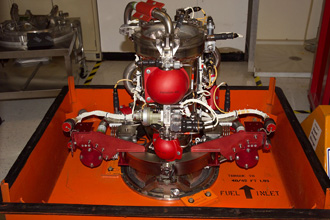
OMS engine
The WSTF Depot is certified to perform general disassembly, reassembly, failure analysis, repair, and acceptance testing of the manual valve.
OMS/RCS Pressure Relief Valve Assembly: The pressure relief valve (PRV) is installed in the orbiter OMS/RCS propellant pressurization system and is designed to prevent over-pressurization of the system. There are ten pressure relief valves per orbiter vehicle. The WSTF Depot is certified to perform general disassembly, reassembly, failure analysis, repair, and acceptance testing of the PRV assembly and the burst disc and relief valve subassemblies.
OMS Tanks and Gauging Probe Modification: The OMS Tanks are designed to store and supply propellant to the OMS engines and RCS thrusters under extreme acceleration conditions. There are four OMS tanks per orbiter vehicle. The WSTF Depot is certified to perform disassembly, repair, and assembly of OMS tank components. WSTF also developed the process and is certified to modify the forward gauging probe by removing the capacitance element and associated electronics.
For more information, contact Mary Burke, (575) 524-5449 or mary.a.burke@nasa.gov, or Jennifer Cordova, at (575) 524-5522 or jennifer.m.cordova@nasa.gov. For additional information, contact Clifford Madrid, (575) 524-5158 or clifford.d.madrid@nasa.gov.

Jennifer Cordova and Ray Montoya conduct flight critical system components refurbishment at WSTF.
The Hardware Processing Component Test Facility (CTF) was certified as an Orbiter Depot Repair Agency in June 1993. Since then, the CTF has also been certified as an ISS Depot Repair Facility. A repair certification for a particular component consists of a review of facilities, personnel, equipment, and procedures developed for that repair. Upon certification, hardware previously repaired at the original equipment manufacturer is instead sent to WSTF.
CTF has performed flight hardware assembly, repair, and acceptance testing for other private aerospace manufacturers. The CTF depot business line provides the following services:

Class 100 Cleanroom used for the ISS ORCA
Primary Reaction Control Subsystem Thruster: The PRCS thruster provides propulsion capability for orbiter attitude control during ascent, orbit, and entry related phases of flight. The PRCS thruster is an
870 lbf, hypergolic, pressure-fed, fixed thrust engine. There are 38 PRCS thrusters per orbiter vehicle.
The WSTF Depot is certified to perform preventative maintenance, flushing, removal and replacement of failed thruster components, flow rate certification, and acceptance testing including engine hot-fire. WSTF is also certified to perform overhaul and repair of the fuel and oxidizer valve subassemblies.
The Vernier Reaction Control Subsystem (VRCS) thruster provides propulsion capability for orbiter attitude control during orbital related phases of flight. The VRCS thruster is a 25 lbf, hypergolic, pressure-fed, fixed thrust engine. There are six VRCS thrusters per orbiter vehicle.
The WSTF Depot is certified to perform decontamination, removal and replacement of failed VRCS thruster components, replacement of injector standoffs and chamber subassemblies, and acceptance testing including engine hot-fire. WSTF is also certified to perform overhaul and repair of the fuel and oxidizer valve subassemblies.

Bob Waggoner and Brian Doyan collect Acceptance Test Procedures (ATP) data for critical flight hardware.
Orbital Maneuvering Subsystem (OMS/RCS) Engine and Series Valve Repair: The orbital maneuvering subsystem engine (OMS-E) provides propulsion capability for the orbiter during orbital insertion and deorbit maneuvers. The OMS-E is a 6,000 lbf hypergolic, pressure-fed, fixed thrust engine. There are two OMS engines per orbiter vehicle. The WSTF Depot is certified to perform decontamination, disassembly, reassembly, failure analysis, repair, and acceptance testing of the OMS engine. WSTF is also certified to perform overhaul and repair of the bipropellant series valve and pneumatic package subassemblies.
OMS/RCS Quad Check Valve: The quad check valve (QCV) installed in the orbiter OMS/RCS propellant pressurization system is designed to prevent propellant backflow into the helium pressurization system. There are ten QVCs per orbiter vehicle.The WSTF Depot is certified to perform decontamination, disassembly, reassembly, failure analysis, component overhaul, and acceptance testing of the QCV.

OMS/RCS AC Motor Valve: The AC motor valve installed in the orbiter OMS/RCS propellant feed system is designed to provide propellant tank, propellant manifold, OMS/RCS interconnect, and cross-feed isolation. There are 64 ac motor valves per orbiter vehicle. The WSTF Depot is certified to perform general disassembly, reassembly, failure analysis, repair, and acceptance testing of the AC motor valve and actuator/valve subassemblies.
OMS/RCS Manual Valve: The manual valve installed in the orbiter OMS/RCS propellant pressurization system is designed to isolate the propellant tank from the pressurization system during ground operations. There are ten manual valves per orbiter vehicle.

The WSTF Depot is certified to perform general disassembly, reassembly, failure analysis, repair, and acceptance testing of the manual valve.
OMS/RCS Pressure Relief Valve Assembly: The pressure relief valve (PRV) is installed in the orbiter OMS/RCS propellant pressurization system and is designed to prevent over-pressurization of the system. There are ten pressure relief valves per orbiter vehicle. The WSTF Depot is certified to perform general disassembly, reassembly, failure analysis, repair, and acceptance testing of the PRV assembly and the burst disc and relief valve subassemblies.
OMS Tanks and Gauging Probe Modification: The OMS Tanks are designed to store and supply propellant to the OMS engines and RCS thrusters under extreme acceleration conditions. There are four OMS tanks per orbiter vehicle. The WSTF Depot is certified to perform disassembly, repair, and assembly of OMS tank components. WSTF also developed the process and is certified to modify the forward gauging probe by removing the capacitance element and associated electronics.
For more information, contact Mary Burke, (575) 524-5449 or mary.a.burke@nasa.gov, or Jennifer Cordova, at (575) 524-5522 or jennifer.m.cordova@nasa.gov. For additional information, contact Clifford Madrid, (575) 524-5158 or clifford.d.madrid@nasa.gov.